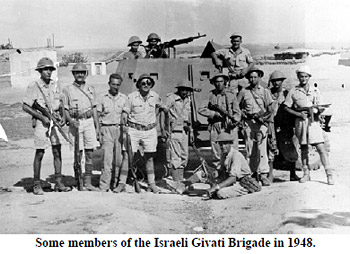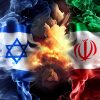Let’s continue to take an in-depth look at how prophecies concerning Israel were fulfilled in the 20th Century and continue to be fulfilled to this day, particularly as they relate to the resurgence of the Israeli military.
The prophet Ezekiel referred to the revival of Israel in the last days as producing “an exceedingly great army” (Ezekiel 37:10). Zechariah was more specific. He prophesied that God would make “the clans of Judah like a firepot among pieces of wood and a flaming torch among sheaves,” enabling them to “consume on the right hand and on the left” all their enemies (Zechariah 12:6). He proceeded to state that in the end times, the nation will be so strong that the “feeble among them in that day will be like David, and the house of David will be like God, like the angel of the Lord before them” (Zechariah 12:8).
Let’s look now at the evidence of the fulfillment of these prophecies.
The War of Independence (November 1947 – March 1949)
On November 29, 1947 the United Nations adopted a resolution providing for the ending of the League of Nations Mandate for Palestine, replacing British rule with a partition of the land that would result in the creation of two states, one for the Jews and the other for the Arabs.
The Jews worldwide were elated, even though the piece of territory they were provided was minuscule compared to what they had been promised by the British in the Balfour Declaration in November of 1917. But the Arabs were outraged because they wanted all the land of Palestine. The result was the immediate launching of a civil war as the Arabs began to attack Jewish communities. This bloody conflict continued right up to the day that the Jews issued their declaration of independence on May 14, 1948.
As that epic day approached, the Arabs issued repeated warnings that they would launch an all-out war if the Jews proceeded to establish a nation. For example, the Secretary General of the Arab League, Azzam Pasha, declared, “It will be a war of annihilation. It will be a momentous massacre in history that will be talked about like the massacres of the Mongols or the Crusades.”1
On the Jewish side, there was considerable concern that such boasting could become a reality. Thus, on the eve of the war, Yigael Yadin, the Chief of Staff of the Israeli forces, told David Ben-Gurion, the Jewish leader, “The best we can tell you is that we have a 50-50 chance.”2
The trepidation on the part of the Jews was more than justified. Within hours of the declaration of independence on the afternoon of May 14, 1948, five Arab armies began invading the new nation (Egypt, Syria, Transjordan, Lebanon and Iraq). The Israeli forces consisted at most of 30,000 rag-tag underground fighters who were ill-trained and poorly equipped. (The Israeli Defense Force, known as the IDF, was not organized until after the invasion.)
The Arab armies, particularly the Jordanians, were well equipped and trained. Egypt, Iraq and Syria had air forces. Egypt and Syria also had tank forces. All had modern artillery.3 The troops of Transjordan were led by a British officer, General John Glubb.
Although the United States recognized the new state of Israel immediately, the Truman Administration did not provide any aid. Instead, Truman declared an arms embargo under the naive assumption that it would help avert bloodshed. Meanwhile, the British gladly supplied arms openly to the Arabs, while Israel had to smuggle weapons purchased in Czechoslovakia.
But despite the overwhelming odds against them, the infant Jewish state prevailed. The cost was enormous. A total of 6,377 Israelis were killed, representing nearly one percent of the population (equivalent to an American loss today of three million!). But the Israelis ended up not only with the territory that had been allotted to them by the UN, but also with control of 60% of the area that had been proposed for an Arab state. Arab casualties totaled between 8,000 and 15,000, and they ended up with only 22% of the total territory of Palestine.4
The only key area that the Israelis were unable to conquer was the Old City of Jerusalem. Overall, the war resulted in an incredible victory for Israel.
During the war there were many miraculous events. One occurred at a kibbutz (collective farm) called Yad Mordecai, located 36 miles south of Tel Aviv near the northern border of the Gaza Strip. The kibbutz was located on the coastal road from Egypt to Tel Aviv.
The Egyptian army, composed of 5,000 troops, divided as it moved north. Half the troops headed for Jerusalem, the other 2,500 continued north toward Tel Aviv. The latter unit arrived at Yad Mordecai on May 19. They were heavily armed, and they were backed up with tanks, artillery and air support.5
The kibbutz evacuated all its children and most of its women as they prepared for the Egyptian attack. They were left with 130 defenders (110 kibbutzniks and 20 fighters from Tel Aviv). They dug trenches and reinforced them with sand bags. Their armament consisted of 37 rifles, one anti-tank gun, two light mortars and two machine guns.6

There was no hope for the kibbutz, and its defenders were well aware of that fact. But they bravely dug in and prepared to take what appeared to be a suicidal stand.
The Egyptians attacked furiously with ground troops, tank assaults, artillery barrages, and air sorties. Incredibly, the Yad Mordecai defenders held out for five days! The Egyptians were not able to overrun the kibbutz until the defenders decided to retreat under the cover of darkness due to the fact that half of them had either been killed or incapacitated.7
Over 300 Egyptian soldiers died in the battle, and the five days gave the defender of Tel Aviv time to prepare their defenses. Also, during that time, four Messerschmitt airplanes had arrived from Czechoslovakia and had been hastily assembled. They were used on May 29 to stop the Egyptian army before it could reach Tel Aviv.8
How could 130 untrained civilians with only rudimentary armament hold off the Egyptian army for five days? No one has ever been able to explain it.
In the third segment of this series on the resurgence of the Israeli military as a sign of the end times, we will look at the evidence of the fulfillment of this prophecy through Israel’s Six Day War.
Notes
1) Akhbar el-Yom newspaper (Egypt), “Interview with Abd al-Rahman Azzam Pasha,” October 11, 1947. (Translated by R. Green.) Referenced in “Israeli War of Independence” Background & Overview,” Jewish Virtual Library, www.jewishvirtuallibrary.org/jsource/History/1948_War.html, page 3.
2) Golda Meir, My Life (NY: Dell, 1975), pp. 213, 222, 224.
3) Benny Morris, The Road to Jerusalem: Glubb Pasha, Palestine and the Jews (London: I. B. Tauris, 2003), page 35.
4) Wikipedia, “1948 Arab-Israeli War,” http://en.wikipedia.org/wiki/1948_Arab%Ez%93Israeli_War, page 40.
5) Benny Morris, A History of the First Arab-Israeli War (New Haven, CT: Yale University Press, 2008). Referenced in Wikipedia, “Battle of Yad Mordecai,” http:en.wikipedia.org/wiki/Battle_of_Yad_Mordechai
6) Zionism and Israel Encyclopedic Dictionary, “Battle of Yad Mordecai, 1948,” http://zionism-israel.com/dic/Yad_Mordecai_battle.htm, page 1.
7) Ibid., page 4.
8) Ibid., page 5.









So are you saying this WAS the fulfillment of the Psalm 83 prophecy?
Read a different post by Nathan and see now it is a set up for what is to come. Sorry for being so,dense anon